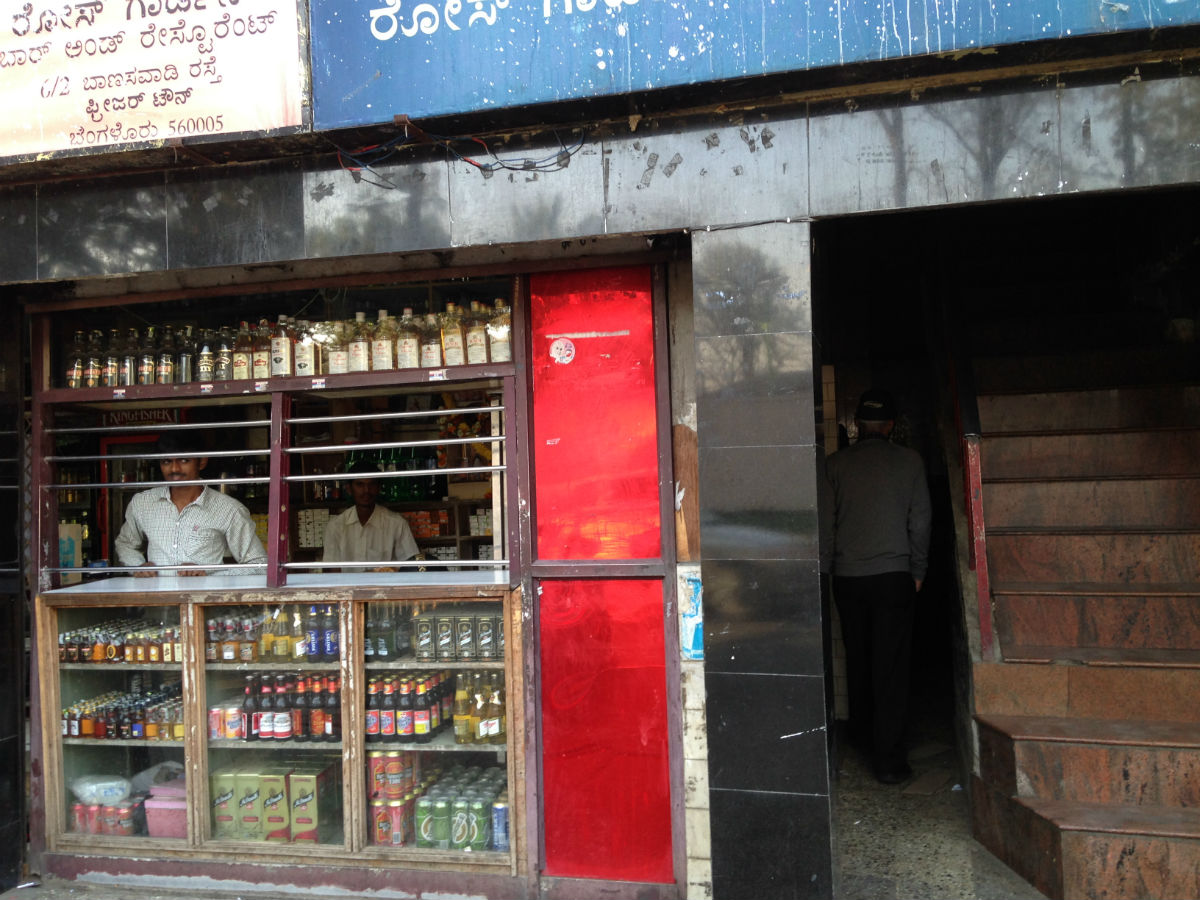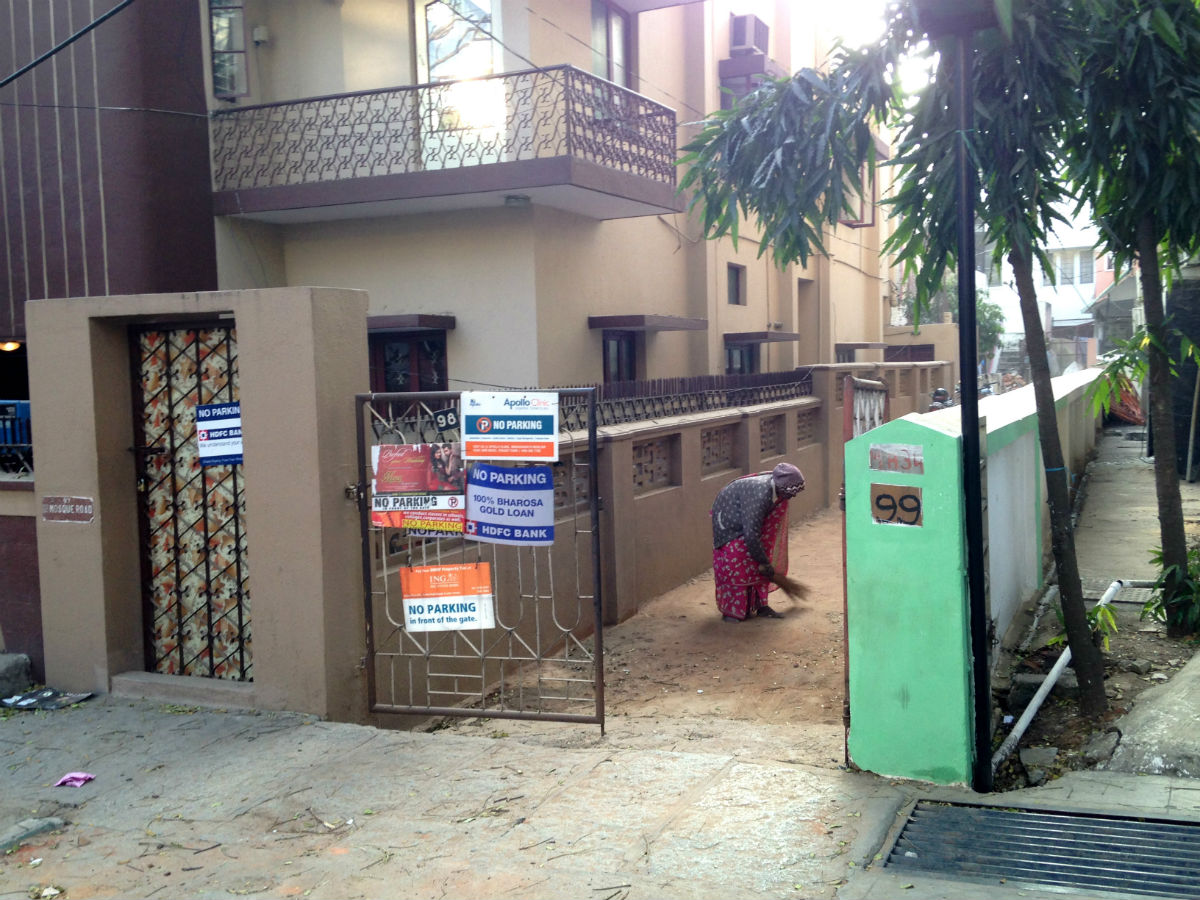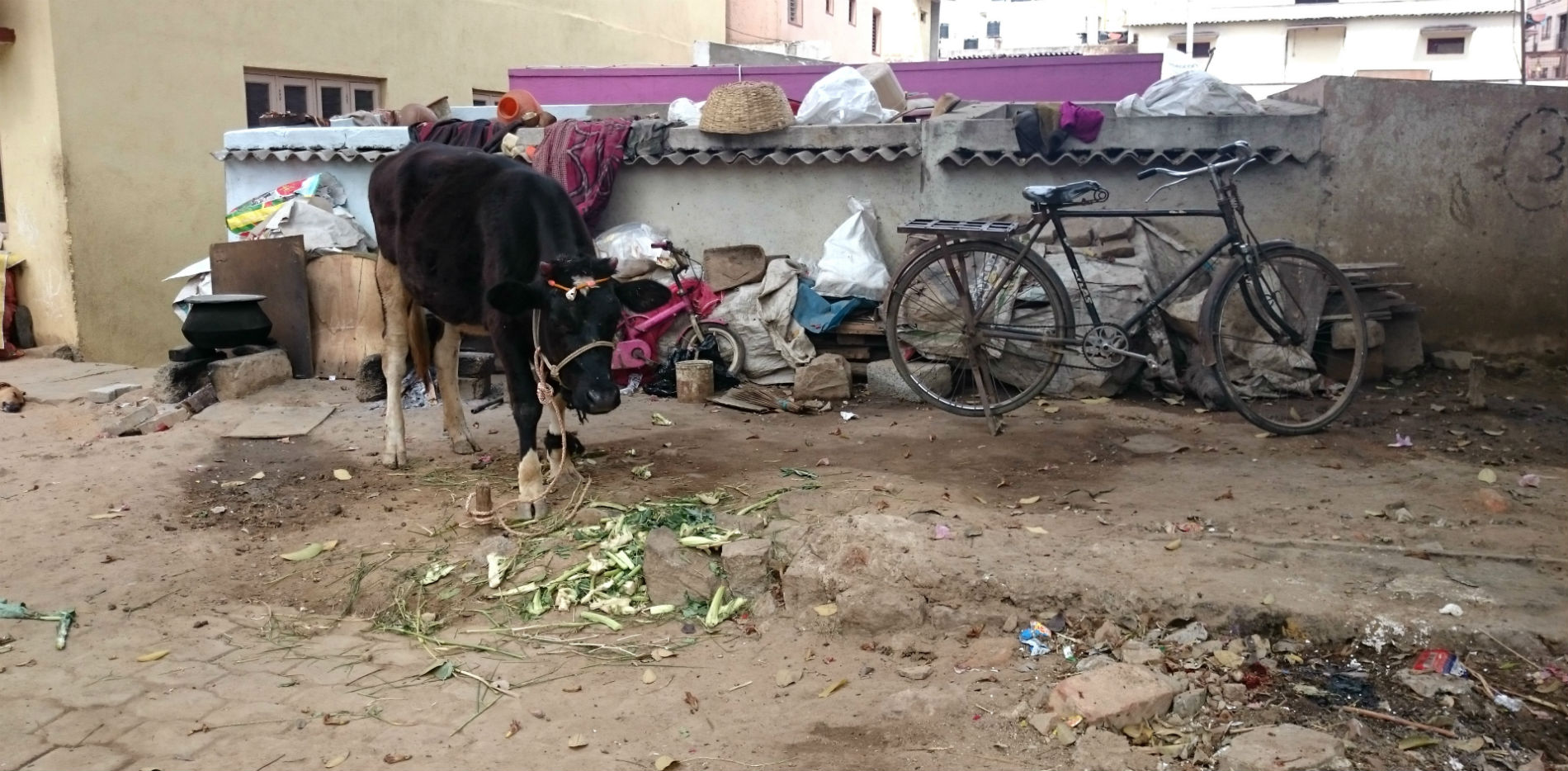Meera Vijayann inspired rights activists around the world with her Ted Talk on violence against women and girls. In an exclusive piece for Lacuna, she reports from Bangalore on life for women in domestic servitude. These women are part of a growing, insecure workforce, lacking in employment rights and a proper wage. But increasingly it is violence at home that makes life unbearable
Kalanidhi lets out a heavy sigh as she bends forward to adjust the length of her sari. The 50-year-old’s face is gently lined; her expression is one of tired resignation.
A few moments before our interview Kalanidhi was busy, cleaning the house, sweeping the floor and washing the dishes. Now she sits crossed legged, sipping tea. She earns $16 (10 British pounds) every month for her work. This is her everyday routine, and she has grown used to it.
“I have lived in Bangalore for 50 years,” she says, “and I have been working here for 15 years. At first, I started working in a local printing press. After that, I started doing household work. It’s been 10 years since I started working here in Cox town. Time passes by quickly.” She smiles.
Much of her youth was filled with pain and fear. The children loved their mother but were powerless to change things.
Kalanidhi grew up in a violent household and watched her father beat her mother most days. Much of her life has been devoted to the care of her ailing mother, who recently passed away. When I ask why she never married, she replies that as a child, she watched her father abuse alcohol and beat her mother every day. “He had a very violent temper,” she says, “and he would come home reeking of alcohol. He would scream at my mother and beat her all the time. But my sister, brother and I wouldn’t intervene. We were too scared. We didn’t do anything but study.”
Much of her youth was filled with pain and fear. The children loved their mother but were powerless to change things. “She endured it because that’s what a woman does,” Kalanidhi says. “She was devoted to my father and she accepted the way things were.
In urban areas in India, domestic workers like Kalanidhi are treated as outcasts. At work, they are unprotected and vulnerable, lacking in labour rights and a minimum wage. Most have little or no access to healthcare, legal aid, or maternity leave. At home, often times they face domestic violence and are unable to leave abusive homes without a secure way of supporting themselves. A very basic education leaves them with few options for alternative employment.
Most of these women are from marginalized sections of society and have experienced difficult beginnings, like Kalanidhi, and turn to a life of servitude to make ends meet.
The International Labour Organisation (ILO) has criticized the Indian government’s lack of action on domestic workers, their rights and conditions of work. It says: “Millions of maids working in middle class Indian homes are part of an informal and ‘invisible’ workforce where they are abused and exploited due to lack of legislation.” The organization estimates that the number of domestic maids employed in India surged by nearly 70% between 2001 and 2010.
Blighted lives
To Kalanidhi, legal aid and legislation mean little. What she understands is her reality; many women she knows are abused by their husbands. “I know many. What can we do? It’s how life is. Nothing will change. Men will keep drinking and women will keep getting beaten.” The wounds of her own childhood remain.
“My father used to drink so much that no one came forward with proposals to marry me. Every one would talk about it and they would stay away from my family. We wouldn’t talk to anyone because even if we children did anything wrong, he would take out his anger on our mother. He would beat her every single day. Only when he passed away was my mother at peace. My sister and I stayed on with her because she needed companions. We chose not to marry.”
At one point, Kalanidhi suggests her father might have shown remorse in his muted response to her single status. “I think he didn’t want us to marry because he didn’t want any other man to behave the way with us like he did with my mother.” He loved us, she says with a smile.

Local liquor shop. The bar is open all day and offers cheap alcohol.
Alcoholism, depression and substance abuse among men in the informal sector is a growing and widespread problem, but one rarely discussed openly in India. Easy accessibility to alcohol and the severe health impact of long hours of physical labour has pushed many men to seek comfort in drinking. A study by the India government in 2011 revealed that since domestic workers often come from vulnerable communities and are poor, illiterate and unskilled, they remain overworked, unprotected and maltreated. Furthermore, being separated from their families and the lack of recreational facilities leaves many of them at high risk of depression. The National Institute of Mental Health and Neuro Sciences, a thinktank based in Bangalore, say that pay-day binge drinking is also a serious concern among men employed in daily-wage labour. In and around Bangalore, illicit distillation centres have sprung up to cater to the demand for cheap liquor. Society has so far ignored the negative affect this is starting to have on people’s mental health.
A 2013 report by the Domestic Workers Congress in Karnataka found that even in families with some financial stability, husbands often spent both their income and that of their wives’ on alcohol, pushing families into poverty. The responsibility of keeping their families together fell entirely on their wives, most of whom are young and illiterate. Many of these women search endlessly for work, sometimes taking up domestic work in more than two households, and yet barely earning more than $12 (8 British pounds) a month.
No man will want to marry a woman who is more educated than him
“Do you think that if you had the opportunity to study further, you could have had a better life?” I ask Kalanidhi, as she talked about her past. She looked me in the eye, shaking her head. “What good will education do? Look at girls these days, they don’t care about a boy’s character at all. They only care about his money. Also, no man will want to marry a woman who is more educated than him,” she went on, “At least women like me are still desired by men, but young women like you only care about material things, they are thrifty. No man wants that.”
Kalanidhi’s view that education might make young women “stupid” is a commonly-held belief among many older women influenced by years of growing up in India’s patriarchal culture, where women are often pushed to focus on their families because it is their ‘duty’.
What would happen if I ran away?
Devi left her village in Tamil Nadu to escape her abusive and alcoholic husband. For now, the young maid and mother of two is staying with her mother in Doopanahalli, a small township in East Bangalore. She is looking for work and will most likely find it as a domestic maid.
“He would beat me every day,” she says, her voice a whisper. “It was unbearable. I don’t know a time when he didn’t drink. I left my two boys with him at home, I am so scared that they will not be able to study.”
Devi’s marriage was arranged when she was 13 to a man ten years older than her. Only now, as a woman of 31, has she found the courage to leave, under the pretext of a promising job in a neighbouring state. Prior to leaving her husband, she made $24 (16 British pounds) a month and struggled to make ends meet.
Devi is afraid for her sons. “They are good boys,” she says, “My only worry is that they see him [her husband] drink so much alcohol and beat me every day. I think they might get into that same habit when they grow up.”
Devi’s mother is unhappy about her return. “Sometimes, her husband would get drunk and beat her so badly that one time tried killing herself by drinking disinfectant.” She tells me, “I don’t know what to do. Where will she go now? She has children.”
In 2012, reports emerged that the actual number of domestic workers in India might be nearly 100 million, well above the government estimate of 6.4 million. The city of Bangalore is home to nearly 500,000 workers. Most of these workers are migrants involved in physical labour, often moving to the city to look for work. They find work on construction sites, cleaning drains and cementing road ruptures, guarding buildings or served as bonded labour in quarries. According to the Domestic Workers Rights’ Union, there are more than 80 unregistered placement agencies functioning on the outskirts of the city to exploit and lure young women into household work, where too often they are caught in a vicious cycle of poverty and systemic abuse.
Devi is unfazed by such reports. She adopts this attitude of acceptance towards her husband too. “These beatings happen everywhere. I have seen it. I also endure it. Men will not change. I think it is because alcohol is cheap. I think maybe he also doesn’t like his work so he beats me. But we can’t stop it.”
This resignation reminds me of a maid temporarily employed by my family in Chennai, many years ago. She was 40 at the time, living with an abusive husband. Often she would spend nights with us, saying that there were too many problems in her own home. Once, she told me that her husband had beat her and tried breaking her arm when she refused to give him the money she had earned at the end of the month. Unable to cope with the situation, she took to alcohol herself.
A city of work, opportunity and servitude
The increasing demand for domestic help in the city attracts many low-skilled female migrant workers in surrounding rural regions who dream of a better life. The Indian software sector that thrives in Bangalore is another reason families with lesser means move to the city.
However, a paper published by the International Journal of Social Science and Interdisciplinary research in 2013, highlights that women who take up this domestic work are left with the burden of taking care of entire households, sometimes even living with families permanently in the home to provide round the clock services. Their household duties include washing clothes, cooking meals, taking care of children, taking care of the elderly, sweeping, swabbing, dusting, shopping for grocery and washing vessels.
The Karnataka Unorganised Workers (Regulation of Employment and Conditions of Work) Bill, which was first introduced by the state of Karnataka in 2001 to aid workers in unorganized and informal sectors in accessing basic social security, was a step in the right direction but it failed to take into account a key problem; the cycle of debt and growing problems that workers faced within families. The rate of wages set — between $26 – $28 per month — is barely sufficient for survival, provides no security.

A domestic maid at work in Bangalore
And what of domestic maids? The legislation considers only workers employed with contracting companies or on construction sites. The Minimum Wages Act, 1948, is another piece of legislation that ignores domestic workers. The occupational stress levels of female domestic workers was rarely discussed in public until recently, when a senior Indian diplomat, Devyani Khobragade, was arrested for ill-treating and abusing her help.
Meanwhile, Devi’s eighteen-year old sister, all set to start her working life as a household maid, told me, her voice heavy with sarcasm, “Rich people. They will have all the money, but they will not spare a penny even if we are suffering.” Why doesn’t she pursue further education to open up opportunities for better paid work? After all, she is still very young. She shakes her head, eyes widening: “Girls must not stay out late and study. My mama [uncle] will not allow us out of the home for anything. Even this [our interview] is a big deal.” People like you are different, she says, pointing to me, you are I are not the same, we are different. Her mother will soon begin plans to arrange her marriage.
Lives divided
The young maid’s words stayed with me long after we talked. Yes, we are different; but it isn’t a social divide. I recognised in her my own thirst to experience the world. Having come to the city from a small town in Tamil Nadu, I know of the struggles she will face if she chooses to reject what she has been told is her destiny. And she will question it; her soft, but accusatory tone told me that. Whereas in Devi and Kalanidhi, I sensed a weight that will always remain.
As I walk back to my apartment, the lights in the neighbourhood glow. A few women in the lane haggle with our local grocer. In the dark alley beneath the flyover, the local bar hums and men stream in, standing beside tables, impatiently barking orders at the man behind the counter. The man silently pushes forward glasses filled with whisky and rum, his movements automated, a tired routine. He has seen it all before, and I can tell by his indifference that he hates it. Close by, a woman stands outside the door in her nightdress, screaming for her maid, “Shanti! Shanti! Where are you?” I see a young woman slowly appear from the shadows, holding a pail of water. “Why are you taking so long to clean the porch? Go clean inside.” The employer walks away in a huff. The woman with the pail waits a moment, sighs loudly, then scampers inside after her Madam.



